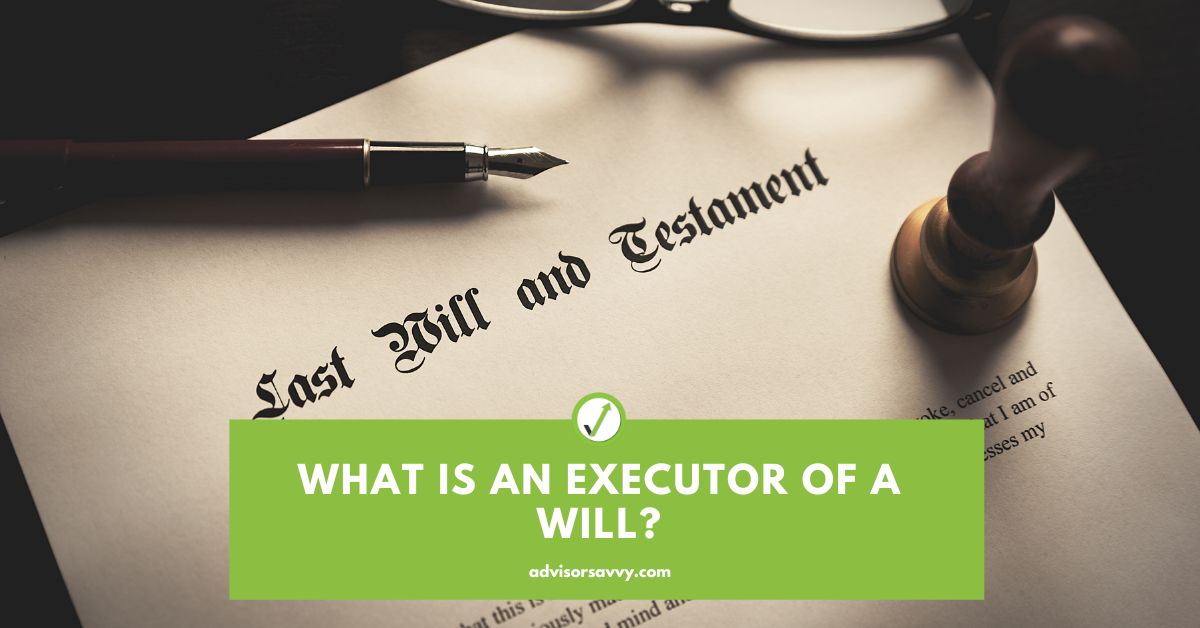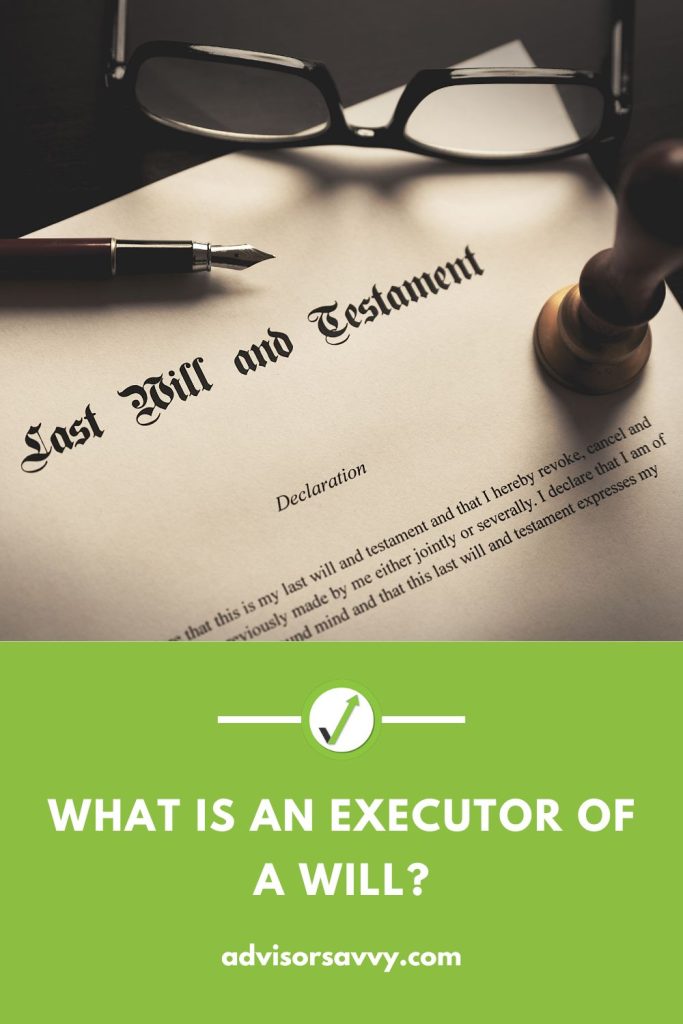
If you’re a Canadian, there’s a good chance you’ve thought about what would happen to your assets after you pass away. Part of this process is creating an estate plan and a will. Estate planning is an important part of life, especially if you have acquired assets throughout your existence. Making sure your loved ones know who will administer your will is also critical. So, what is an executor of a will? Read on to find out!

Table of contents
What is an executor of a will?
An executor of a will is the individual tasked with carrying out the final wishes of the deceased as outlined in their will. This includes distributing assets, paying debts and taxes, and closing accounts. This person is also called an estate representative, trustee, or in Quebec, a liquidator.
The executor is responsible for ensuring all instructions in the will are carried out in a timely and efficient manner. In order to be appointed, one must be named in the will. If there is no will, or if the named executor is unable or unwilling to serve, the court will appoint an individual to serve in this capacity.
Related Reading: Estate Planning Checklist for Canadians
What is an executor of a will responsible for?
Executors are responsible for a wide range of duties when it comes to administering an estate.
First and foremost, they must locate and collect all of the assets belonging to the deceased. This includes both physical assets, such as property and possessions, and financial assets, such as bank accounts and investments.
Once all of the assets have been gathered or located, the executor must safeguard them until they are distributed. This is important both for preserving the value of the estate. And for ensuring that beneficiaries do not have to wait too long to receive their inheritances. In addition, the individual must pay any debts or liabilities owed by the estate. As well as file any necessary tax returns. Finally, the executor distributes the assets to beneficiaries in accordance with the provisions of the will.
What is normal compensation for an executor of a will?
The compensation an executor of a will can vary depending on the jurisdiction. For example, in Ontario, courts permit to charge a rate of 2.5% on both money received and paid out from an estate. This results in an overall effective rate of 5%.
Executors usually receive a five percent portion of the total estate as compensation. This one-time fee splits fairly among all executors, regardless of how many there are.
Ultimately, the amount of compensation received should be commensurate with the amount of work involved in administering the estate. After all, there’s a lot of paperwork and responsibility involved!
Can an executor also be a beneficiary?
Yes. Executors have a legal obligation to administer the estate according to the will. This includes being impartial and not allowing self-interest or bias towards any individuals named in the will.
There is no law stating that an executor cannot also be a beneficiary. Although, potential conflicts of interest that arise often go overlooked. For instance, when most of the estate passes down to a single person, it’s more likely for them to serve as the executor too.
Related Reading: Common Law vs Marriage Canada: What are the financial implications?
Is an executor the same as a trustee?
An executor is someone who is responsible for carrying out the instructions of a will. While a trustee is someone responsible for managing property placed in a trust. Although both executors and trustees have similar responsibilities, there are some important differences between the two roles.
Executors are generally appointed by a court, while trustees are typically chosen by the person who creates the trust. Executors are also generally in charge of all of the property in an estate. While trustees only manage the property that has been placed in the trust. In addition, executors are required to follow the instructions of the will. While trustees have a fiduciary duty to act in the best interests of the beneficiaries of the trust.
Can the executor of the estate change the will?
No. Executors can’t change a will without the beneficiaries’ permission because they have a duty to act in everyone’s best interests.
Alterations of a will are possible by creating a deed of variation, but the executor cannot do this alone. The deed must be co-signed by anyone whose inheritance would be lessened by the proposed changes.
Can the executor of a will change it and remove beneficiaries? Also no. If you’re named in the will as a beneficiary, the executor won’t be able to reduce what you’re entitled to — unless, of course, you agree.
Choosing an executor of a will
Making a will is tough, as it involves decisions that will affect your family. While deciding how to divide up your assets, assign guardianship for dependents, and plan for taxes will take up most of the conversation, you’ll also need to consider who should be the executor of your will.
The executor is the individual who makes sure that your final wishes, as mentioned in your will, are completed. Obviously, finding the ideal person is a pivotal part of any well-made estate plan. In most cases, you will have a conversation with the individual you choose before formally naming them in your will. In other words, an executor knows they’ll be an executor beforehand in most cases.
Related Reading: How to Become a Certified Financial Planner in Canada
Who should you choose to be the executor of your will?
Ensure you can trust this person to make decisions for you when you’re not around by making sure their goal is what’s best for you. Rather than any personal gain. Choose an experienced and qualified person to carry out the tasks.
Rather than assuming you have to do everything on your own, it would be wiser to look for someone who is willing and able to enlist help from other professionals, like lawyers or financial planners. When you’re deliberating over who to name as the executor of your will, you might be drawn towards a blood relative because they possess the know-how and context. Though, it’s important to consider if they have the time to commit to seeing the job through.
Furthermore, it couldn’t hurt to introduce your executor to professionals like your lawyer, financial planner or accountant. Doing so will likely make them feel more comfortable reaching out for help in the future if need be.
If you are not a resident of Canada, the court is unlikely to accept you as an executor of a will. If they do, it creates more work with additional filing requirements. It’s best to avoid choosing an individual who is a U.S. citizen living in Canada, or another foreigner, as they may need to file extra paperwork. Executors who live out of province may have a hard time completing their required tasks as well. By choosing an executor within your own province, the process will be more streamlined.
It’s crucial when choosing an executor for your will that they don’t predecease you. For instance, a business partner or elderly friend may not be around long enough. As well, it’s key to occasionally review your decision to ensure the executor is still alive and willing or able to fill their role.
Should I hire a professional executor?
Hiring a professional executor is a consideration not to take lightly. If you have a complicated estate or want to avoid burdening your surviving family members, consider hiring a professional executor, such as a corporate trustee. They will have the experience and ability needed to administer your estate efficiently and without bias. When searching for a professional executor, study the company’s fee structure and compare it to other companies. Also, research what services they provide as well as how much experience they have in overseeing estates. Keep in mind that this process may cost your estate money. However, the losses you endure if mistakes happen are likely exponentially higher.
It may be beneficial to have two executors instead of one. Getting professional help to execute your will alongside a family member can be the best of both worlds. Combining the trust of someone you know with the experience and ability of a trained professional. By having a professional executor, there is a guarantee your family member won’t make any costly errors or act out in disobedience to your will. Additionally, designating a backup executor is also intelligent planning on the off-chance that your first selection becomes unable to fill the role.
Read More: RRSP Contribution Deadline: How to Plan Ahead

